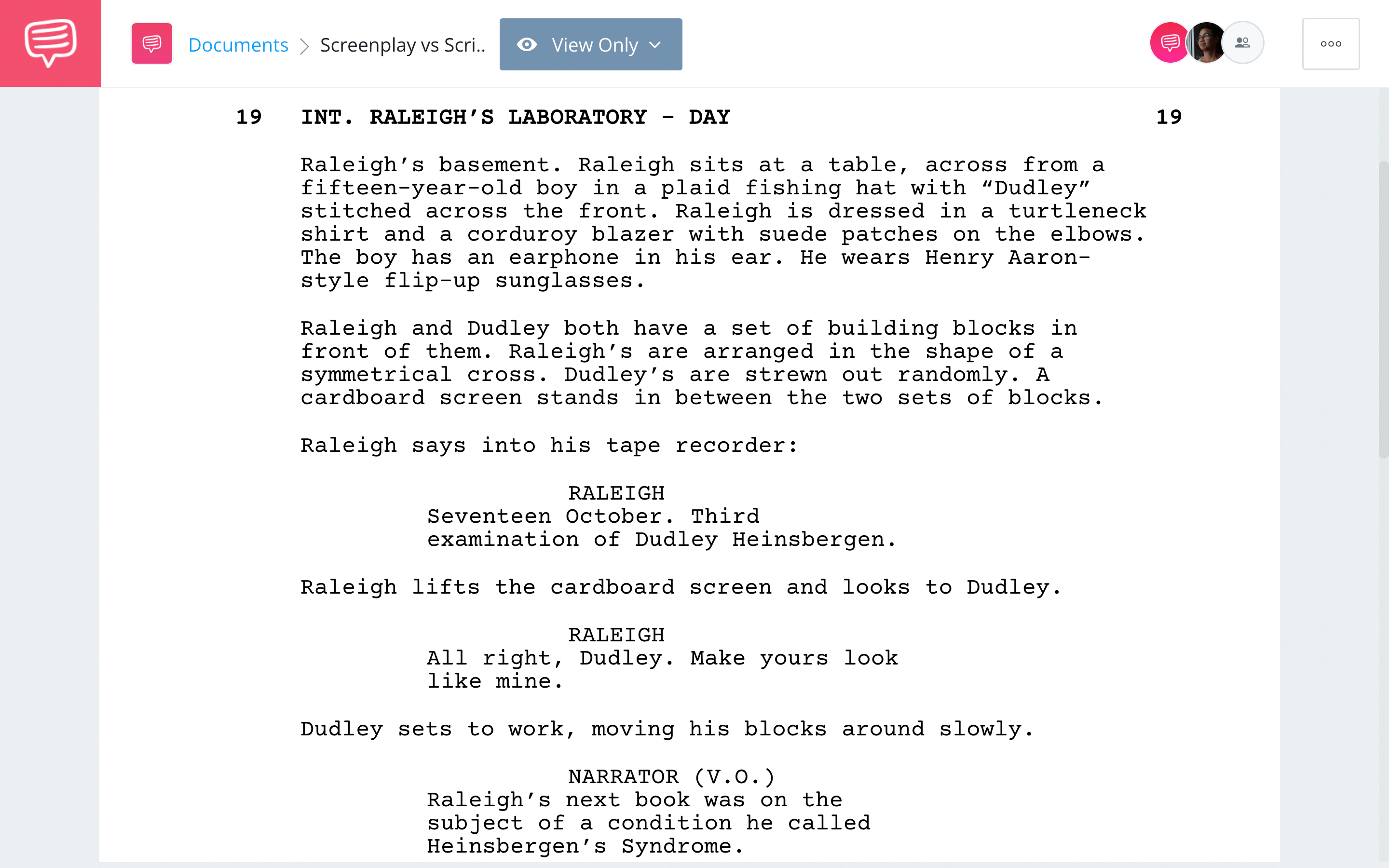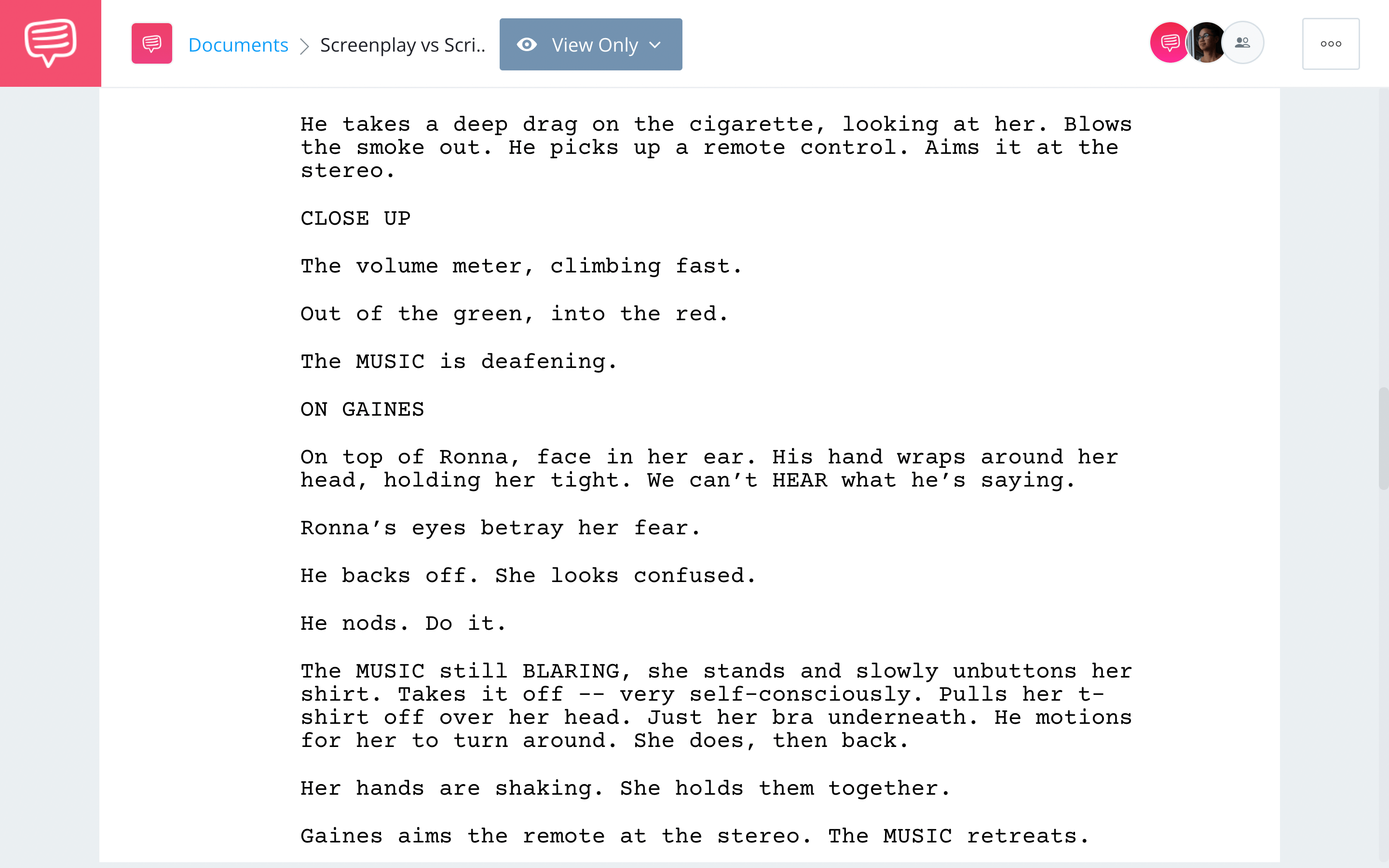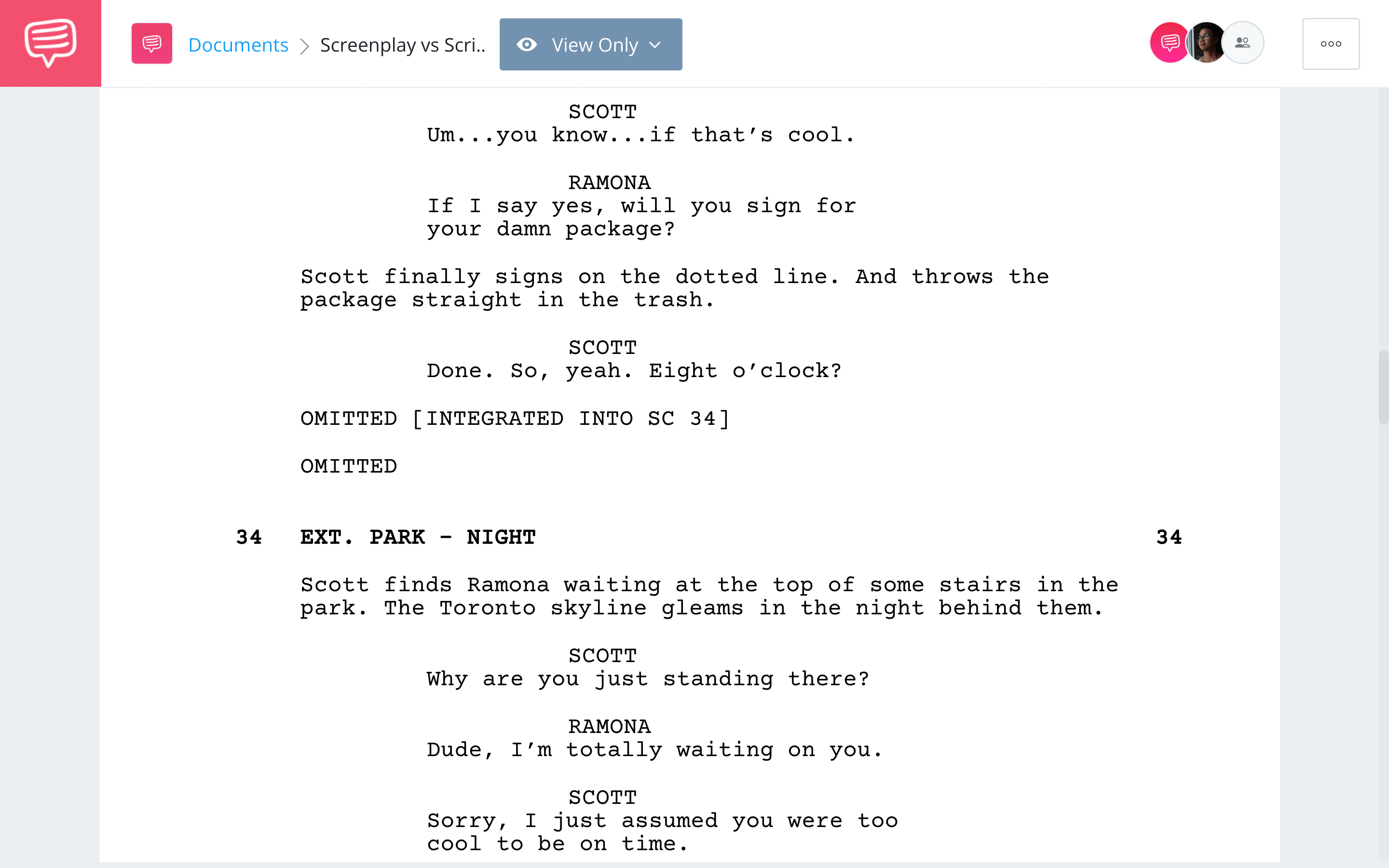When you browse for movie scripts online, you can get all kinds of results. And in these instances, what you look up online may not be exactly what you’re looking for. In some cases, what a screenwriter ends up finding is a script and not a traditional screenplay. This is how we get into the situation of screenplay vs script, where the two are similar, but not exactly the same. In this article, we are going to cover both “screenplay” and “script,” while comparing and contrasting the two. In this way you won’t have to keep asking “Is screenplay and script the same thing?” So let’s get into the specifics of each, while providing examples of how these two similar formats can differ.
Script vs Screenplay
What is a screenplay?
How does one define screenplay? As the name might imply, a screenplay tends to refer to scripts written in mind for the screen. Here we will see some major differences between a screenplay and a script. We then start by covering a basic definition before digging into specifics.
DEFINE SCREENPLAY MEANING
What is a screenplay?
A screenplay is a written work that either tells an original story or adapts a pre-existing one for the purposes of being made into a short or feature film. Screenplays aim to provide as much detail and information as possible in a matter that flows and is consistent. In this way, screenplays give readers an idea of how the story might play out on-screen.
Screenplay characteristics include:
- Reliance on prose to tell the story
- Descriptive detail to engage and entertain the reader
- Dialogue and descriptions of places, events & settings
Screenplays are definitely a type of script, but they are not what you would consider a traditional shooting script. This is because the job of a screenwriter is to tell a story, one that will make a possible investor want to put money into the project. As a result, a key difference with a script vs screenplay is the technical details that are reserved for “on-set” scripts are not present.
Putting a screenplay into StudioBinder’s screenwriting software allows us to easily see how a screenplay looks. The amount of detail clues us that what we’re seeing is meant to be read carefully with the intention of understanding the world of the screenplay. This is one of the biggest differences between a screenplay and a script, as you can see below for The Royal Tenenbaums.
Screenplay vs Script • Read the scene here
One thing you will notice between a screenplay vs script is the lack of technical details. We have the details of the setting and scene in the same way as we might in a fictional book.
The major difference, of course, is the format of the text; information, especially dialogue, is clearly separated and laid out for the reader.
Admittedly, screenplays will share similarities with traditional scripts. This can mostly be seen in how dialogue is formatted (this stays the same) and the specification of whether an environment is an interior (INT) or exterior (EXT). That said, there’s no hard rule saying your screenplay has to look like that, but this industry-standard formatting rules are in place for a reason.
One amusing thing to note is that spec scripts have more in common with traditional screenplays. This is because they are meant to showcase the screenwriter’s abilities for telling a story over the technical details. In this way, a spec script is a similar sibling to a regular screenplay.
Related Posts
Script vs Screenplay Meaning
What is a script?
After going over some differences between a screenplay and a script, we can now venture directly into a definition of a script. It does not get more open ended than the word “script,” so let’s dig into that definition below, before providing specific examples regarding a movie script vs screenplay.
SCRIPT DEFINITION
What is a script?
A script is a written document that often features dialogue, as well as setting and character information. Scripts have been used for centuries and are used in all sorts of media that uses predetermined actions (like a narrative or speech). In this way, the word “script” can be considered the general term for the document used to tell a story and/or dialogue in mediums such as movies, plays, and video games.
Script characteristics include:
- Clearly defined dialogue and detailed settings
- Detailed technical info for the cast and crew (for shooting scripts)
- Tells a story primarily through dialogue and descriptions
Both screenplays and scripts are written to be read, but scripts for in-production films are mainly to coordinate and have everyone on the same page. So even if a lot of the screenplay is still there, it can be restructured and altered for the purposes of a shoot.
Not only that, but the screenwriter is almost never there for the shoots, unless of course the director, or someone else on set, is the writer.
The first thing you will notice on a legitimate script is how many revisions it has gone through and which version of the script you're currently reading. These are the types of scripts you will find online and they often double as the shooting script. They tend to be colored in person, but online, you must rely on the color name alone.
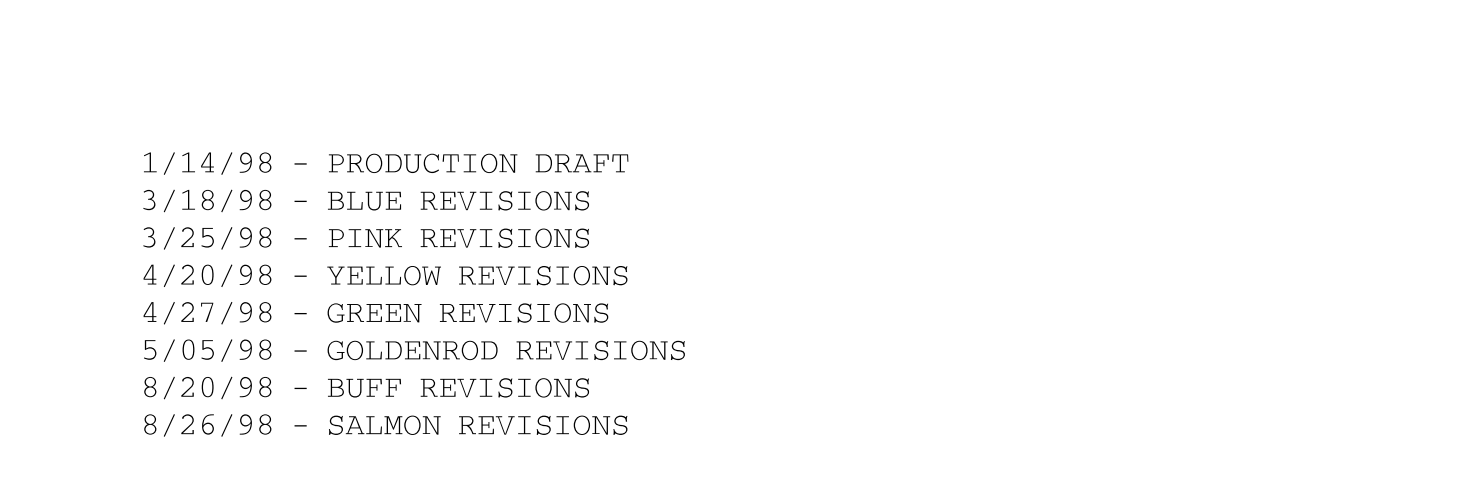
Screenplay vs Script • Revision Colors
A script for a shoot is when those tech details come into play. Below is a quick example of how a script can specify a camera move and even actions within a scene. Some of this can be retained from the screenplay, but other aspects will be altered to fit the needs and standards of a shooting script.
Screenplay vs Script • Read the whole scene here
StudioBinder’s software also makes it easy to plot out how a script will look. INT/EXT notes become extremely important on a script, and our software makes it easier than ever to make them stand out. Colors can also be changed, and the script can be worked on within the software itself.
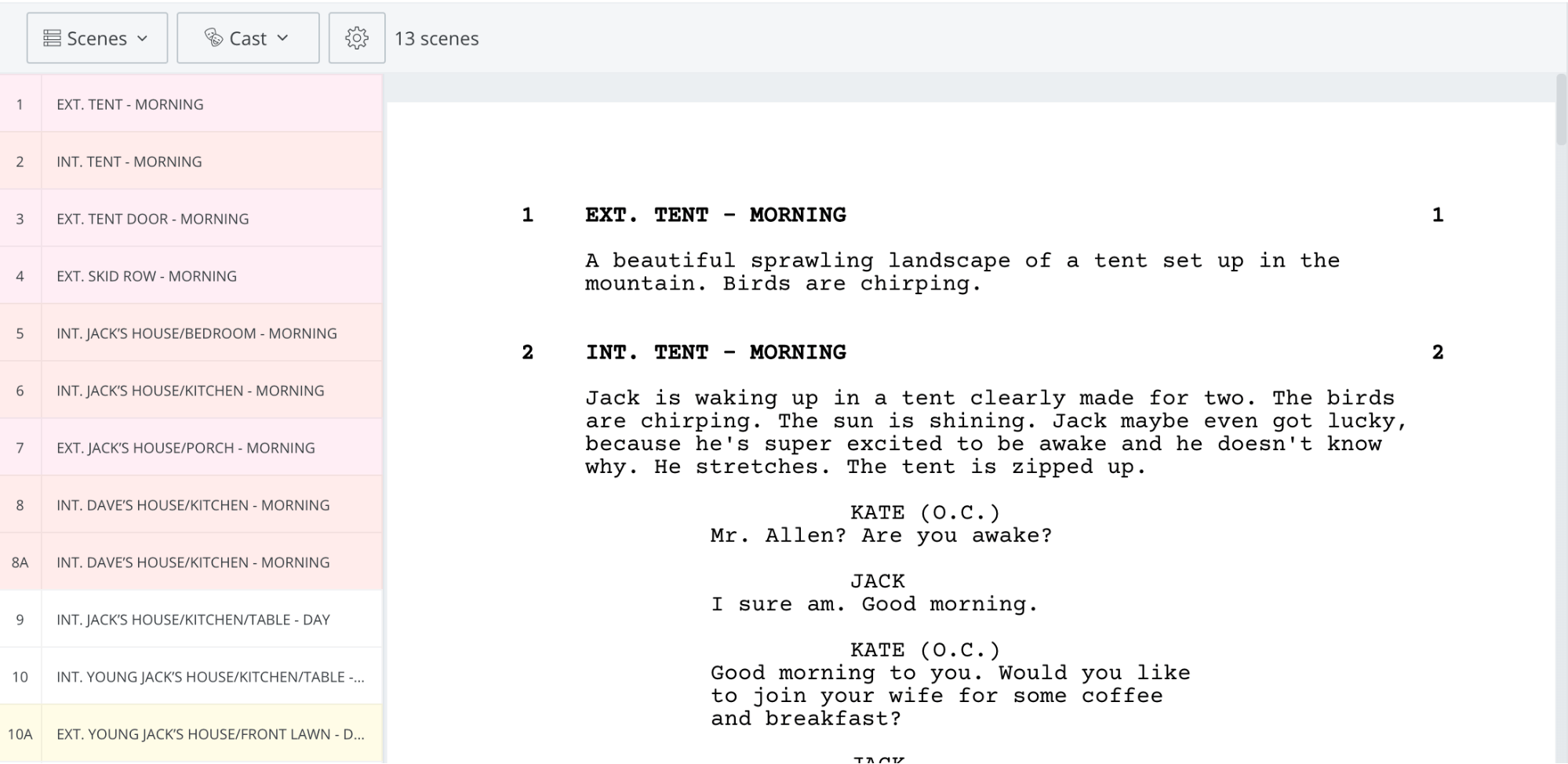
Screenplay vs Script • Help differentiate locations with SB software
A few other things unique to a script versus a screenplay are the use of multiple page/scene numbers and omissions. It is not unusual for the fifth or sixth version of a script to have pages or scenes omitted and listed as such. This is done because reprinting and distributing a whole new script is way too much work; a simple “omission” is really all you need, so long as it’s made clear to all involved. You can see an example of this below with the script for Scott Pilgrim vs the World.
Screenplay vs Script • Read the entire scene here
Scripts and screenplays do have a lot in common, but it’s important to know their differences. After all, if you’re writing a screenplay, you want to make sure you’re telling a story, not directing a movie. It’s only once a screenplay is finalized does a script emerge for a cast and crew to work with.
Up Next
Read the Best Free Scripts Online
Now that you have a better understanding of screenplay vs script, why not take a look at some of the most popular scripts only? You can see how they differentiate from each other while also seeing how different screenwriters approach writing for a film, be it an original work or adaptation.

